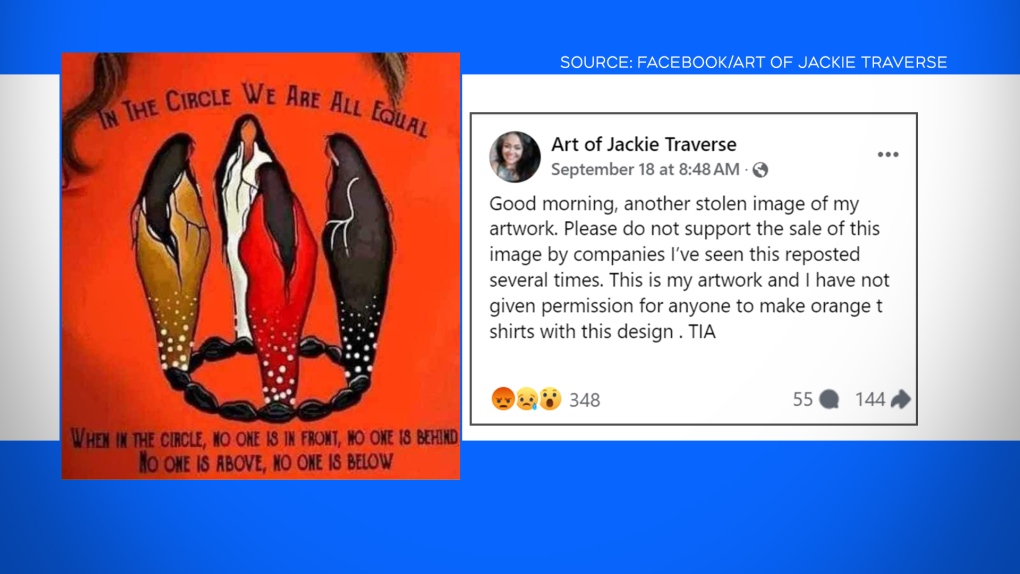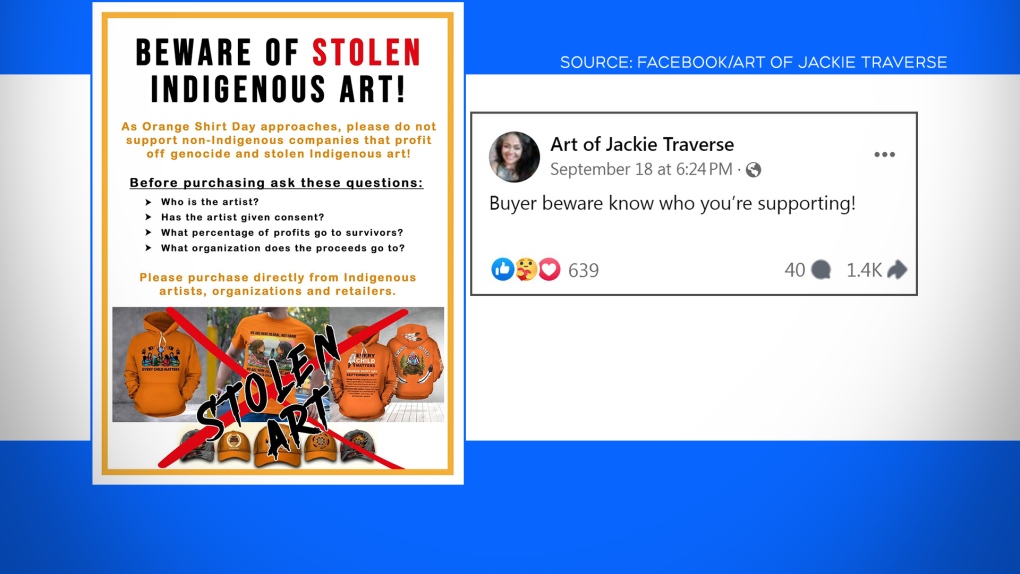'It's my most stolen image': Concerns raised about stolen Indigenous art for Orange Shirt Day
Many people will soon be wearing an orange shirt, an action meant to honour those impacted by residential schools, but not all orange shirts are what you think.
An Indigenous artist has a buyer-beware warning ahead of Sept. 30, the National Day for Truth and Reconciliation.
- The information you need to know, sent directly to you: Download the CTV News App
- Sign up now for daily CTV News Winnipeg newsletters
Jackie Traverse said she's been dealing with stolen art on orange shirts for five years now. This year, she's found two online sellers on Facebook using her art, one a more recent work featuring a turtle, the other of four women, which she says was first stolen from her 13 years ago.
 Art work by Jackie Traverse, which she says is constantly stolen and used as a design for products. Uploaded Sept. 24, 2024. (Jackie Traverse)
Art work by Jackie Traverse, which she says is constantly stolen and used as a design for products. Uploaded Sept. 24, 2024. (Jackie Traverse)
“It's still very popular. It's my most stolen image,” Traverse said.
She could send a cease-and-desist order, but Traverse said it keeps happening every year. Instead, she and a friend designed an educational poster, encouraging buyers to ask questions about who is profiting from the shirt sales and who the art belongs to.
“Those are basic things they should have. If they don't have them, then that probably means they stole the artwork off the internet.”
 Jackie Traverse shares a poster so people know what they are buying for Orange Shirt Day. Uploaded Sept. 24, 2024. (Jackie Traverse)
Jackie Traverse shares a poster so people know what they are buying for Orange Shirt Day. Uploaded Sept. 24, 2024. (Jackie Traverse)
Every September, Katie German does her best to support an Indigenous-run business when buying her family orange shirts.
“It’s an Indigenous thing and it should be Indigenous-led, Indigenous-supported. Money should be going back to the Indigenous artists. That's how it works,” she said.
The shirts German bought are from INAC in CF Polo Park Mall.
This year's INAC shirt design was a concept staff came up with as a group, and a local artist brought it to life. Owner, Michelle Cameron, said some of their designs have been stolen too. In 2021, she said she bought up 100,000 blank orange shirts to keep the proceeds within the Indigenous community.
“Do you not make Sept. 30 about an opportunity to make money,” Cameron said.
“This is changing the lives of survivors. They are finally healing from all of this because of the truth that's coming out.”
Cameron said INAC donates a portion of its profits from the sale of orange shirts to organizations supporting Indigenous communities.
CTVNews.ca Top Stories

Aviation experts say Russia's air defence fire likely caused Azerbaijan plane crash as nation mourns
Azerbaijan on Thursday observed a nationwide day of mourning for the victims of the plane crash that killed 38 people and left all 29 survivors injured as speculation mounted about a possible cause of the disaster, with some experts saying that the airliner was damaged by Russian air defence fire.
Police identify victim of Christmas Day homicide in Hintonburg, charge suspect
The Ottawa Police Service says the victim who has been killed on Christmas Day in Hintonburg has been identified.
Boxing Day in Canada: Small retailers fear big shopping day won't make up for tough year
It’s one of the busiest shopping days of the year: Boxing Day sees thousands of people head to malls and big box stores to find great deals. But it's not so simple for smaller shops.
Raised in Sask. after his family fled Hungary, this man spent decades spying on communists for the RCMP
As a Communist Party member in Calgary in the early 1940s, Frank Hadesbeck performed clerical work at the party office, printed leaflets and sold books.
Finland stops Russia-linked vessel over damaged undersea power cable in Baltic Sea
Finnish authorities detained a ship linked to neighboring Russia as they investigate whether it damaged a Baltic Sea power cable and several data cables, police said, in the latest incident involving disruption of key infrastructure.
Police in New Brunswick investigating Christmas Eve sudden death
An unconscious individual was found in the 600-block area of Lancaster Avenue early Christmas Eve morning, and was later pronounced dead at a hospital.
Body found in wheel well of plane at Maui airport
A person was found dead in the wheel well of a United Airlines flight to Maui on Tuesday.
Your kid is spending too much time on their phone. Here's what to do about it
Wondering what your teen is up to when you're not around? They are likely on YouTube, TikTok, Instagram or Snapchat, according to a new report.
'Wicked' will make its streaming debut on New Year’s Eve, with deleted and extended scenes
Universal Pictures, the studio behind the hit film, announced on Thursday that “Wicked” will be available to buy or rent on December 31 on digital streaming platforms including Prime Video and Apple TV.

































